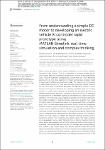Mostrar el registro sencillo del ítem
From understanding a simple DC motor to developing an electric vehicle AI controller rapid prototype using MATLAB-Simulink, real-time simulation and complex thinking
| dc.contributor.author | Ramírez Montoya, María Soledad | |
| dc.contributor.author | Ponce, Pedro | |
| dc.contributor.author | Ramirez Mendoza, Ricardo A. | |
| dc.contributor.author | Molina, Arturo | |
| dc.contributor.author | MacCleery, Brian | |
| dc.contributor.author | Ascanio, Mack | |
| dc.date.accessioned | 2022-11-24T00:38:08Z | |
| dc.date.available | 2022-11-24T00:38:08Z | |
| dc.date.issued | 2022-11-21 | |
| dc.identifier.citation | Ponce, P., Ramirez, R., Ramirez-Montoya, M.S., Molina, A., MacCleery, B. & Ascanio, M. (2022). From understanding a simple DC motor to developing an electric vehicle AI controller rapid prototype using MATLAB-Simulink, real-time simulation and complex thinking. Frontier in Education, 7:941972. doi: https://doi.org/10.3389/feduc.2022.941972 | es_MX |
| dc.identifier.doi | https://doi.org/10.3389/feduc.2022.941972 | |
| dc.identifier.uri | https://hdl.handle.net/11285/649925 | |
| dc.description.abstract | Electric drives have been used in several applications, such as electric vehicles, industry 4.0, and robotics. Thus, it is mandatory to promote updated electric drive courses that allow students to design novel solutions in these engineering areas. However, traditional undergraduate courses that only cover theoretical aspects and do not allow students to interact and produce practical results through experimentation are insufficient today. The students are not exposed to educational innovation, so they have difficulties proposing original solutions. On the other hand, conventional theoretical and laboratory courses in which students follow specific directions for achieving predefined goals do not allow students to create novel solutions and integrate the innovation process as a standard methodology. Moreover, beginning in 2020, the COVID-19 pandemic forced professors to implement digital tools and materials to continue education intensively. This proposed course presents an alternative to promote practical and theoretical knowledge in students. Besides, engineering students must create innovative solutions to increase the quality of life in rural and urban communities, which calls for novel experimental approaches. Electric drives are fundamental elements in electric systems and industrial processes proposed to save energy or control electric machines. In addition, industries urge specialized engineers who can tackle complex industrial problems. The proposed educational methodology can be implemented in manufacturing, agriculture, robotics, and aerospace. Hence, low-cost devices to validate the proposed solutions became used by students to achieve novel solutions using electric drives. This paper describes an undergraduate course called “Digital Control of Electric Machines” (electric drives) and its implementation of the Tec21 Educational Model of Tecnologico de Monterrey, V Model, MATLAB/ Simulink, low-cost hardware, and complex thinking. The content of the course begins with electric machine models and power electronics that allow students to move from the basic to the advanced industrial electric drive problems in a friendly manner. In addition, the V-model and Modelo Tec 21 are used as fundamental pillars of the leading innovative structure of the proposed course. The results showed that students mastered several soft and hard skills to accomplish complex design goals, including controlling an electric rapid prototype vehicle. | es_MX |
| dc.format.medium | Texto | es_MX |
| dc.language.iso | eng | es_MX |
| dc.relation.isFormatOf | publishedVersion | es_MX |
| dc.relation.url | https://www.frontiersin.org/articles/10.3389/feduc.2022.941972/full | es_MX |
| dc.rights | openAccess | es_MX |
| dc.rights.uri | http://creativecommons.org/licenses/by/4.0 | es_MX |
| dc.subject | HUMANIDADES Y CIENCIAS DE LA CONDUCTA::PEDAGOGÍA::TEORÍA Y MÉTODOS EDUCATIVOS | es_MX |
| dc.subject.lcsh | Education | es_MX |
| dc.title | From understanding a simple DC motor to developing an electric vehicle AI controller rapid prototype using MATLAB-Simulink, real-time simulation and complex thinking | es_MX |
| dc.type | Artículo/Article | es_MX |
| dc.identifier.journal | Frontiers in education | es_MX |
| dc.identifier.orcid | https://orcid.org/0000-0002-1274-706X | es_MX |
| dc.subject.keyword | energy | es_MX |
| dc.subject.keyword | Digital Learning Innovations | es_MX |
| dc.subject.keyword | R4C&TE | |
| dc.identifier.volume | 7 | es_MX |
| dc.identifier.issue | 941972 | es_MX |
| dc.contributor.affiliation | Instituto Tecnológico y de Estudios Superiores de Monterrey | es_MX |
| dc.contributor.affiliation | National Instruments, Austin, TX | es_MX |
| dc.contributor.affiliation | ABB, Motion Drives Product (MODP) | es_MX |
| dc.subject.country | Suiza / Switzerland | es_MX |
| dc.identificator | 4||58||5801 | es_MX |
Ficheros en el ítem
Este ítem aparece en la(s) siguiente(s) colección(ones)
-
Artículo 1151
Article

